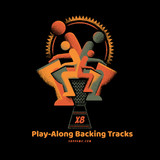Cajon Drums
Cajon drums are thought to have originated in Peru and Cuba in the 1800s by central and West African slaves brought to the South American region. These drums were crafted in secret in order to retain some of the cultural rituals that were stripped from the lives of the slaves. The unique box shape of the cajon drum we know today replicates the drums that slaves created out of various and common items that were considered trash, like crates or old drawers. These drums were easily disguised as tables, stools or other purposeful items within the living quarters of the slaves. The need to disguise the drums was due to the restraints put upon slaves’ ability to sing or create music, and the subsequent punishment that could occur if drums or other instruments were discovered. With the cajon (meaning, “box”) drum, the slaves were able to play music, yet keep it secret at the same time.
Today, cajon, or “box” drums are constructed from light wood, such as pine, and are played in different countries around the world, but are especially popular in Cuba and Peru, where the manufacturing of cajon drums for public consumption began. The sounds from the cajon drum can be adapted to several different styles of music, including rock and hip hop as well as Afro-Cuban music such as the rumba.
When playing the cajon drum, it is best to sit or straddle the box, positioning the side with the hole toward the back. There are different tones that a cajon can produce, but the most common are the open tone, which requires a flat hand and the fingers together to strike toward the top of the drum with all four fingers, and the bass tone that requires an open palm and fingers spread, hitting the front of the drum with the entire hand.
The history of the cajon drum and its ease of play make it a fun and intriguing instrument to bring to any recording session, drum circle, class or workshop.
Recent Posts
-
X8 Drums Play-Along Backing Tracks
The new X8 Play-Along Series is being produced for our musician friends wanting a fresh way to work …9th Feb 2025 -
What is the Best Size Djembe for Beginners?
If you're new to the world of percussion and interested in learning the djembe, you're in for a t …16th Jul 2024 -
The Benefits of Becoming a Drumming Teacher: Transforming Passion into Profession
Why become a drumming teacher? Becoming a drumming teacher is an excellent way to share your pas …22nd May 2024



